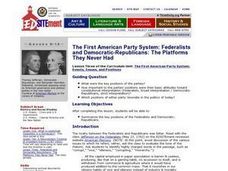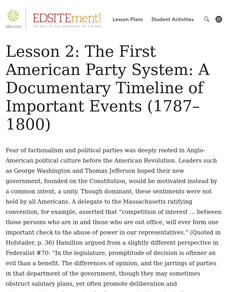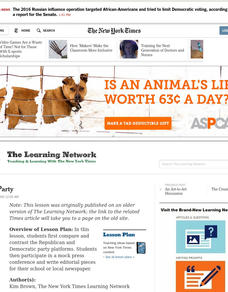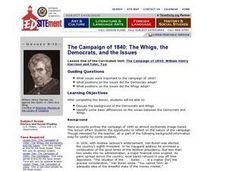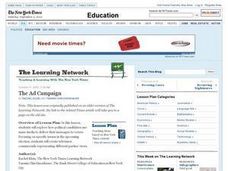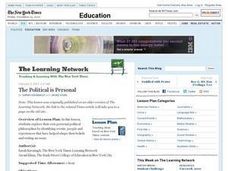Curated OER
The First American Party System: Federalists and Democratic-Republicans: The Platforms They Never Had
Students investigate the beginnings of the political party system in the US. They determine the key positions of both the Federalists and the Democratic-Republicans. They compare the views of the early political parties with those of today.
National First Ladies' Library
Politics! Politics! The Emergence of Political Parties in the U.S.
High schoolers are split into six small groups which focus on one of six websites, that tell the story of the emergence of the Federalist and Democratic-Republican parties at the end of the 18th century. They compile a chronological list...
Curated OER
The First American Party System: A Documentary Timeline of Important Events (1787-1800)
Students conduct research on the events of the end of the 18th century in order to identify critical factors leading to the development of the Federalist and Democratic-Republican political parties. They summarize the key positions of...
Curated OER
It's My Party
Students compare/contrast the Republican and Democratic platforms using Venn diagrams, then read and discuss, "The Conventions Are Over. The Party's Just Starting." students then participate in a mock press conference and write editorial...
Curated OER
The Declaration of Independence
Students identify and examine the Declaration of Independence and ascertain its true intent and its eventual realization. Then they analyze the Declaration of Independence and summarize the intentions of the Declaration. Students also...
Curated OER
Lesson Plan: Early Political Parties
Students examine the platforms of early political parties in the United States. For this political parties lesson, students discover details regarding the attributes and ideals of the federalists and the democratic-republicans. Students...
Curated OER
Do Factions Control Political Parties Today?
Students establish how the first political parties were formed. In this U.S. History lesson plan, students work in groups to share their personal viewpoint on various topics provided by the teacher, then they are assigned to bring...
Curated OER
In Praise of Political Parties
Students research a political party and prepare a report about its history, philosophy, and the party's position regarding two major political issues. They complete a variety of additional creative activities regarding their party, as well.
Curated OER
Alexander Hamilton and the Roots of Federalism
Explore the origin of political parties in the United States. Learners work in groups to read and analyze copies of the "Report on Manufactures" written by Alexander Hamilton. Then, they complete a worksheet comparing the Federalists to...
Curated OER
History of Political Parties in the U. S.
Twelfth graders name some of the parties in the political system of the United States. They identify the two main parties along with key information, issues, events, elections and/or people for each system. They then break into groups...
Curated OER
The Campaign of 1840: The Whigs, the Democrats, and the Issues
Students reflect on the nature of the campaign of 1840. They identify the positions of the Democrats and the Whigs and their basic differences.
Curated OER
Party Like It's 1992 or '84 or '76 or '68!
Students explore, analyze and study how political party platforms have changed over time. They create a party platform time line by researching Republican and Democratic Party stances on various issues during the last few decades.
Encyclopedia Britannica
Becoming US President
It's that time of year, and the year. Once again the race is on for the White House. It's important that young voters, and would-be voters, understand the process for becoming the United States President. Class members research the...
Curated OER
Making Conventions Unconventional
Students discover how Internet altered the public's involvement in the 2000 Democratic and Republican conventions, and synthesize their evaluations of convention sites to design their own pages for a convention-related Web site.
Curated OER
Political Party Development
Young scholars complete a Venn Diagram comparing the Democratic Republicans and the Democratic Party today. In groups, they research the key concepts of the Democratic Party today and write a short summary. They share their ideas and...
Curated OER
Political Parties
Twelfth graders give their current events presentations to the class today. After completing the "T" exercise on classifying certain individuals as Democrats or Republicans, they pair up to figure out where the political parties fit into...
Curated OER
The Free Trade Conundrum: Balancing Worker Wages and Consumer Prices Comparing the 19th and 21st Centuries
By examining free trade, protectionism, and analyzing 19th and 21st century arguments for and against the tariff, high schoolers will be able to compare and contrast the 19th and 21st century. They will analyze text, answer discussion...
Constitutional Rights Foundation
The Election of 1912
The Election of 1912: an election with four competitive opponents. Pupils get to know the candidates with informative reading passages that provide context to the election. Then, the class engages in a debate and answers questions as one...
Curated OER
The Presidential Nominating System
High schoolers examine the process by which candidates for U.S. president are nominated by the Democratic and Republican parties. They identify the differences between primaries and caucuses and key terms and issues related to the...
Curated OER
Two's Company; Is Three a Crowd?
Students explore the history of third-party politics in America. They research the impact of one third-party or independent candidate for president and develop a poster and stump speech representing that candidate's motivation for running.
Curated OER
Structure of Congress
Students examine the structure of Congress. They identify the roles of the Democratic and Republician parties and their leaders. They role play the role of congressmen and pretend to pass new legislation.
Curated OER
The Ad Campaign
Learners explore how political candidates use mass media to deliver their messages to voters. Focusing on specific issues in the upcoming election, students create television commercials representing different parties' views.
Curated OER
The Political is Personal
Students examine their own political party affiliations and political beliefs. After reading an article, they discuss how students at Duke define their political philosophies. They brainstorm events, people and experiences that have...
Curated OER
Political Ideological Spectrum
Students explore the ideologies of the American political spectrum. In this American politics lesson plan, students examine the characteristics and platforms of liberals, conservatives, libertarians, and moderates. Students...
